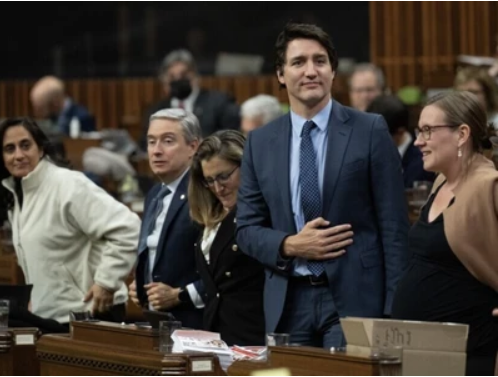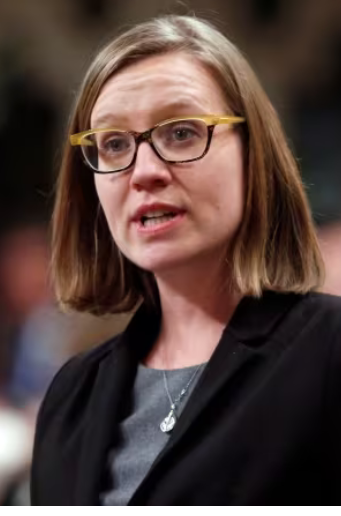 By Pepper Parr
By Pepper Parr
February 3rd, 2024
BURLINGTON, ON
The quality of our democracy is facing unprecedented threats.
Low voter turnout, mistrust in institutions, polarization, and hostile partisan politics are of deep concern to many. Making progress on electoral reform requires political leadership, but politicians alone won’t fix the system that elected them.
There is a belief that changes have to be made in how we elect leaders federally but no clear view on just how that can be done.
Teachers have said they have no experience teaching civics and are uncomfortable with the subject that has the potential to become very partisan.

Dave Meslin
Unlock Democracy Canada, an organization founded and run by Dave Meslin who has been at it since November of 2007 is finding support from Citizens Assemblies, an incredible innovation in democracy, and a practise that originated Canada
A citizens’ assembly is a group of people selected by lottery from the general population to deliberate on important public questions so as to exert an influence.
A citizens’ assembly is part of a process used to create public policy.[ Its members form a representative cross-section of the public, and are provided with time, resources and a broad range of viewpoints to learn deeply about an issue. Through skilled facilitation, the assembly members work to find common ground on a shared set of recommendations. Citizens’ assemblies can be more representative and deliberative than public engagement, polls and legislatures. They seek quality of participation over quantity.
There is a House of Commons motion (M86) on the table. A “motion” is not a “bill”, the government could choose to simply ignore the outcome. There is however, an enormous value in raising public awareness, building cross-party support in Ottawa, and building further momentum towards future goals.
In February, 2023, MP Mike Morrice (Kitchener Centre) put forward a private members motion for a National Citizens’ Assembly on Electoral Reform. A motion can have a maximum of 20 joint seconders, this motion quickly achieved that, with MPs from four parties seconding it.
The Morrice motion did not come to a vote in the House of Commons; it was too far down the list in the “order of precedence” for private members business.

Members of the House of Commons during a vote.
In June, 2023, building on the momentum and cross-partisan support, MP Lisa Marie Barron (Nanaimo-Ladysmith) put forward a new motion for a National Citizens’ Assembly on Electoral Reform (motion M-86).
This motion was debated for the first time on November 7, 2023, a vote is expected sometime in early 2024.
A National Citizens’ Assembly on Electoral Reform:
Is a non-partisan, independent, trusted process
Is composed of citizens selected at random, like a jury
Includes Canadians from all walks of life, with special care to ensure that participants reflect Canadian society, including by age, gender, ethnicity and region of Canada
Engages citizens to learn from experts, thoughtfully consider an issue, and make a recommendation
Without pre-judging various kinds of electoral systems, a citizens’ assembly will review options to improve the current electoral system. They would be free to recommend keeping the status quo (first-past-the-post), ranked ballots, or a proportional system.

Burlington MP Karina Gould speaking in the House of Commons in 2017
A CBC report in February of 2017 said: ”
Seven months after her predecessor described the current electoral system as “antiquated,” and one week after the Liberal government abandoned its pursuit of reform, the new minister of democratic institutions defended first-past-the-post during an appearance before a House of Commons committee.
“The first-past-the-post system may not be perfect — no electoral system is,” Karina Gould said Tuesday during an appearance before the procedure and House affairs committee.
“But it has served this country for 150 years and advances a number of democratic values that Canadians hold dear, such as strong local representation, stability and accountability.”
The decision to abandon the Liberal Party’s commitment to implement a new electoral system was “difficult” but “responsible,” Gould said, citing a lack of consensus around the options.




















Something should be done to restore representation by population this is a quote from a recent Globe and Mail article. I’m sure the Trudeau government is rushing to solve this problem for Alberta. “And Alberta isn’t alone. Ontario and British Columbia, the two other fastest-growing provinces, are also wildly underrepresented. The average Alberta riding is nearly 15 per cent larger than the average across the country – or in other words, an Albertan’s vote is worth about 87 per cent as much as that of the average Canadian. (See chart, “Relative weight of a vote, by province.”) By the same calculus, a vote in Ontario is worth about 93 per cent of the national average, while a vote in B.C. is worth 92 per cent. By contrast, a Newfoundlander’s vote is worth 1.5 times the average, while a vote in PEI or the Territories is worth nearly three times as much. And the gap is growing.”
Trudeau trumpeted in his campaign that 2015 would be the last FPTP federal election. Then as soon as elected he threw the Ministry of Democratic Institutions and the Minster herself under the political bus. It was an embarrassment that still haunts the Liberal Party and I imagine our MP Karina Gould. I doubt she wrote the script she read in Parliament noted above. In fact I wonder if it was already written during the campaign, waiting to be used once the Liberals won?
I’m also wondering if Citizens Assemblies, managed by Parliament is just another episode of “Bait and Switch Canadians”, coming to a theatre near you?
Personally I’ve always been in favour of ranked ballots, but I’m not holding my breath.
Editor’s note: The Assemblies are not managed by Parliament. They would report to Elections Canada.
Sorry Editor, but I believe that Elections Canada creates reports to the Federal Government that lead to Bills before Parliament to change the Elections Act. So no matter how Citizens Assemblies make their cases, the reports to Elections Canada eventually make their way to Parliament in the form of a Bill for adoption by democratic vote by MPs in Parliament. So eventually any changes in how we vote are controlled by our MPs, not by a public vote by citizens. Unless some kind of special plebiscite is created to allow the citizens to directly vote on it, which would be quite something if Parliament ever allowed it.
Voter interest today is playing to the old maxim: “cut the taxes, and if services must also be cut, let them be cut for someone else”. Who cares what the voting system is if more than half the population can’t even bother to vote, much less understand what they might be voting for? Politicians don’t care, since they have mastered gaming the FPTP system. The problem starts in the schools, where civic responsibility is an unknown concept, and the result is what we have.
Nah, don’t buy that for a nano-second. Once in power the Trudeau brain trust figured out that abandoning first past the post was cutting off their pinocchio noses. So why not come clean rather than B.S their way out of a broken promise. Per an earlier article Ford would have at least expressed his mia culpa and would have moved on with the NDP and Liberals calling foul. Admitting mistakes is not in the Liberal DNA.
https://thestarphoenix.com/opinion/columnists/phil-tank-trudeau-may-now-regret-his-broken-electoral-reform-promise
Phill Tank: “The seat projector at 338canada.com suggests the current polling numbers would translate to 199 seats for the Conservatives, 66 for the Liberals, 37 for the NDP, 34 for the Bloc and two for the Greens.
That projection for the Conservatives (although there are more ridings now) would be the most seats won by any party since Brian Mulroney’s 1984 Progressive Conservative landslide delivered 211 seats.
You can see the basic problem with our current system in these potential results, since 40 per cent of voters could deliver nearly 60 per cent of the seats to the Conservatives. A similar vote share won Trudeau his 2015 majority.
So the case for reforming our democracy is compelling. But when the parliamentary committee tasked with kickstarting the process of implementing the federal Liberals’ 2015 campaign promise veered into territory Trudeau disliked, it ended potentially the most impactful change ever to Canada’s democracy.”
Now Trudeau is tanking and rightfully, so he now wants to change the rules, so the media ramp up the call for change, using lack of voter turnout at the municipal level as the excuse for the federal level change? Seriously? The turn out will be unprecedented. And I guarantee he will reduce the voting age to sixteen. He will do anything to win. And then watch out if he does.